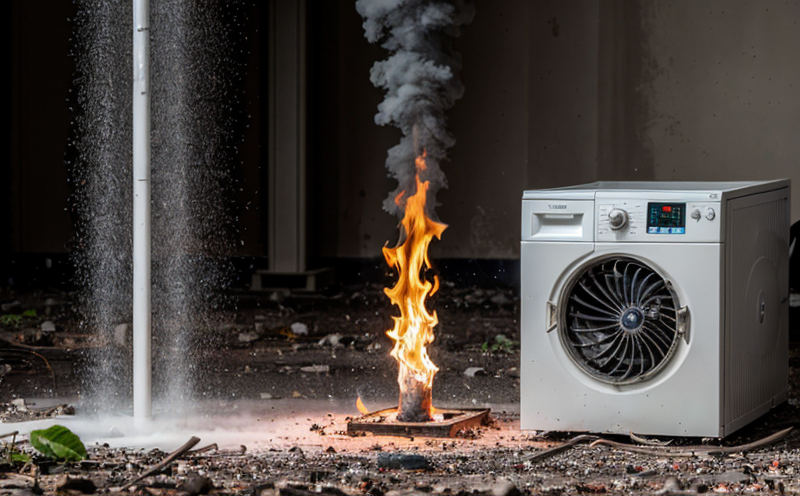IEEE 1725 Environmental Stress Testing of Rechargeable Batteries for Mobile Phones
The IEEE standard IEEE 1725 provides a comprehensive framework for environmental stress testing rechargeable batteries intended for use in mobile phones. This standard is crucial for ensuring the reliability and durability of these batteries under various environmental conditions that they might encounter during their operational lifespan.
Environmental stress testing, as defined by IEEE 1725, aims to simulate real-world scenarios where the battery may be exposed to extreme temperatures, humidity, and other environmental factors. The primary objective is to identify any potential weaknesses or vulnerabilities that could lead to performance degradation or failure.
The testing process involves subjecting the batteries to a series of controlled environments designed to mimic conditions such as high heat, cold exposure, humidity cycling, and thermal shock. By doing so, manufacturers can ensure their products meet stringent quality standards before they reach consumers. This not only enhances consumer confidence but also supports regulatory compliance.
One key aspect of IEEE 1725 is its emphasis on safety protocols during testing. The standard outlines procedures to prevent hazards associated with handling lithium-ion batteries, which are known for their high energy density and potential risks if mishandled or exposed improperly. Proper handling practices include using appropriate personal protective equipment (PPE), ensuring proper ventilation in test chambers, and adhering strictly to prescribed operating temperatures.
Another important feature of IEEE 1725 is its focus on data collection throughout the testing process. Detailed records are kept regarding temperature variations, duration of exposure, voltage readings, and other critical parameters. This information allows manufacturers to analyze how each batch of batteries responds under different environmental stresses, enabling them to make informed decisions about design improvements or material substitutions.
Moreover, IEEE 1725 plays a significant role in promoting sustainability within the electronics industry by encouraging recycling efforts post-testing. Many modern rechargeable batteries contain valuable materials that can be recovered and reused through proper disposal methods. By following this standard’s guidelines for safe testing practices, companies contribute positively towards reducing electronic waste.
In summary, IEEE 1725 Environmental Stress Testing of Rechargeable Batteries for Mobile Phones serves as an essential tool in safeguarding both product quality and end-user safety. Through rigorous environmental simulations and stringent data documentation, this standard helps manufacturers produce reliable, safe, and efficient mobile phone batteries that meet global standards.
For more detailed information about IEEE 1725 or to discuss how we can assist your organization with compliance testing services based on this standard, please contact our team today.
Applied Standards
The application of IEEE 1725 is particularly relevant for those involved in the mobile phone industry. Compliance with this standard ensures that manufacturers adhere to internationally recognized benchmarks for environmental stress testing, thereby enhancing their reputation and marketability.
- Temperature Cycling: Batteries are subjected to rapid changes between hot and cold temperatures to simulate conditions encountered during shipping or storage.
- Humidity Cycling: Exposure to varying humidity levels helps assess the battery's resistance against moisture ingress, which can cause short circuits if not properly managed.
- Thermal Shock: Sudden temperature shifts test the battery’s ability to withstand rapid changes without compromising performance or integrity.
By incorporating these elements into their testing protocols, manufacturers demonstrate commitment to producing high-quality products that can endure challenging conditions encountered throughout their lifecycle.
Customer Impact and Satisfaction
Adhering to IEEE 1725 Environmental Stress Testing significantly improves customer satisfaction by ensuring that mobile phone batteries perform reliably even in harsh conditions. Consumers appreciate products that last longer without compromising on safety or performance.
- Better Product Reputation: Compliance with this standard enhances a company’s reputation, attracting more customers seeking reliable and safe electronics.
- Increased Market Share: By offering superior quality batteries, companies can gain competitive advantages in the market.
- Improved Safety: Ensuring that batteries meet stringent safety requirements protects users from potential hazards associated with faulty or poorly tested products.
- Higher Customer Trust: Demonstrating commitment to rigorous testing procedures builds trust among consumers and stakeholders alike.
In conclusion, IEEE 1725 plays a vital role in fostering customer satisfaction by delivering dependable mobile phone batteries that meet international standards. This not only benefits end-users but also strengthens the overall industry’s reputation for quality and innovation.
Competitive Advantage and Market Impact
In today's competitive market, meeting or exceeding industry standards like IEEE 1725 can give companies a significant edge over competitors. Here’s how compliance with this standard contributes to business success:
- Differentiation in the Marketplace: Adhering to rigorous testing procedures sets brands apart from others offering similar products.
- Better Brand Image: Consistency in meeting high-quality benchmarks improves brand perception among consumers and partners alike.
- Potential for Innovation: Continuous improvement processes driven by robust testing encourage innovation within the company.
- Positive Regulatory Compliance: Meeting these standards ensures smooth interactions with regulatory bodies, avoiding costly penalties or delays in product launches.
Beyond immediate market benefits, companies that prioritize such standards contribute positively to the broader industry ecosystem. By setting higher benchmarks for themselves, they inspire others to follow suit, ultimately raising overall quality levels across the sector.





